Why Does Cat Poop Smell So Bad?
Even the most ardent cat lovers find it difficult to tolerate cat poop’s strong and disagreeable smell. So, the question is, why does cat poop smell so bad?
The unpleasant odor of cat feces is influenced by various factors, including VOCs (volatile organic compounds), bacteria, moisture levels, nutrition, litter type, cat age, and health. Bacterial decomposition produces offensive smells, while excessively dry or wet feces can have stronger odors too. Also, higher protein and fat content can intensify pungency, resulting in a more pronounced flavor profile. These factors contribute to the overall smell of cat feces.
However, to reduce this awful smell, we gathered some necessary tips for you. We have answered all the relevant questions and other relevant topics in this content. Let’s read.
Want to know more about cats:
11 Reasons Why Your Cat’s Poop Smells So Bad
Similar to other animals, cats’ bodies convert the food they eat into nutrients and waste. Defecation is the next step in the removal of these wastes from the body. In cats, the digestive process takes just 12 to 24 hours to complete.
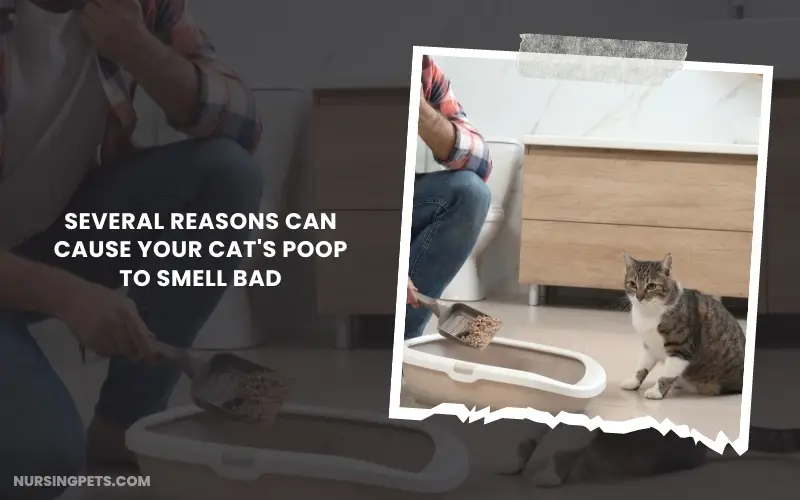
As mentioned, several things can cause an unpleasant odor in cat feces. Now, let’s discuss them in detail.
1. Volatile Organic Compounds
Volatile organic compounds (VOCs) are one of the main causes of the bad odor of cat excrement [source]. When organic material, like cat waste matter, breaks down, several substances are created.
Cat feces include a variety of VOCs, like indole, skatole, and thiols, which are released as the proteins break down. These can emit strong and disagreeable stench, which is hard to tolerate.
2. Presence of Bacteria
The stench of cat excrement is partly a result of the microorganisms present. Cats’ digestive systems have Numerous microorganisms that assist digestion and food breakdown.
However, these bacteria in the cat’s feces continue to break down the waste during defecation, generating gases that add more stench.
Also, the bacterial makeup of the cat’s feces may alter if it is on medicine or has a medical condition, which makes the smell worse.
3. Diet
Your cat’s poop may smell differently depending on the sort of food it consumes. High-protein diets based on meat might produce a more offensive scent.
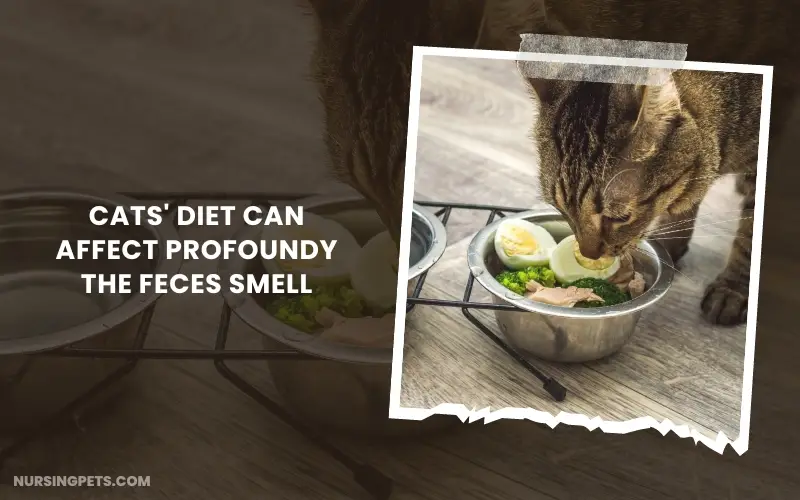
In contrast, cat food fillers like maize (corn) and wheat can lead to larger and more frequent bowel movements. Artificial flavors and preservatives in cat food may also change the bacterial makeup in the stomach and make the stench more overpowering.
4. Digestive Disorders
The consistency and smell of cat feces might alter as a result of digestive conditions such as irritable bowel syndrome, inflammatory bowel disease, and dietary intolerances. These illnesses may obstruct food digestion and absorption, resulting in rotten-smelling feces.
5. Parasites
Cats may also have foul-smelling feces due to internal parasites like worms, protozoa, and giardia. These parasites, which have digestive tract residences and which have the potential to interfere with regular digestion, may alter the smell and consistency of feces.
6. Litter Type
Interestingly, cat poop may take on a variety of odors depending on the litter used. However, it’s possible to get absorbent and scented litter to help with odor control. But, if you don’t replace the litter often enough, the smell of cat poop will overshadow any pleasant aroma.
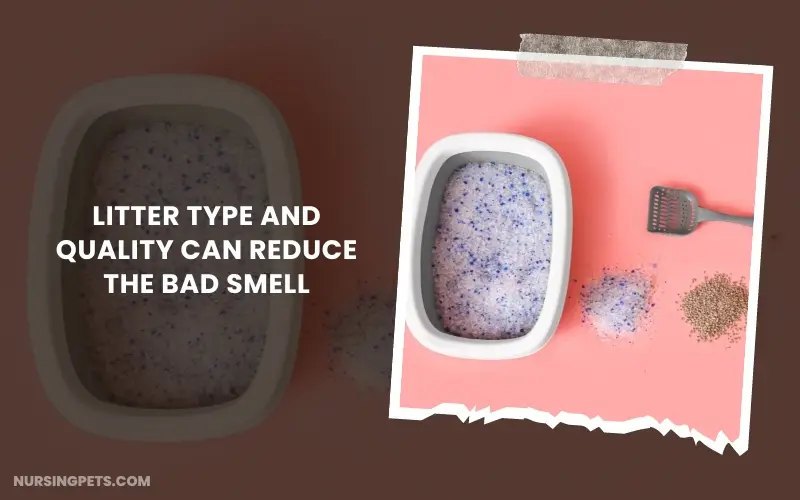
7. Inflammatory Bowel Disease
Inflammatory bowel disease (IBD) is characterized by damage and inflammation in the intestinal lining. It occurs when the immune system mistakenly attacks the gut lining. Cats affected by IBD may have foul-smelling feces and experience persistent diarrhea.
These symptoms reflect the underlying inflammation and disturbance in the digestive system.
8. Moisture Content
The moisture content of cat poop can affect its smell. Dry poop tends to have a stronger odor, while overly moist poop can be unpleasant. Keeping your cat properly hydrated and feeding them a balanced diet helps regulate moisture levels, potentially reducing strong or bothersome odors.
9. Age and Health of the Cat
The scent of your cat’s feces can change based on their age and overall health. As cats age, their digestive system may become less effective, resulting in a stronger and more disagreeable odor. This can be attributed to older cats’ difficulties in properly digesting their food.
10. Anal Gland Problems
On each side of the anus, cats have a pair of anal glands that secrete an offensive odor when they scent-mark their territory. However, when these glands get blocked or diseased, the cat’s waste may take on a very unpleasant stench.
11. Medicine
Certain medications can disrupt the natural balance of gut bacteria or affect hormones, leading to changes in a cat’s poop odor.
Antibiotics, for example, are known to alter digestive bacteria, potentially resulting in foul-smelling excrement during the medication period. Furthermore, vitamin supplements can also contribute to an altered odor.
Can a Cat’s Poop Smell Be a Sign of a Serious Health Issue?
The smell of cat poop sometimes indicates serious health problems. It’s normal for there to be some variation in odor, but significant changes shouldn’t be ignored.
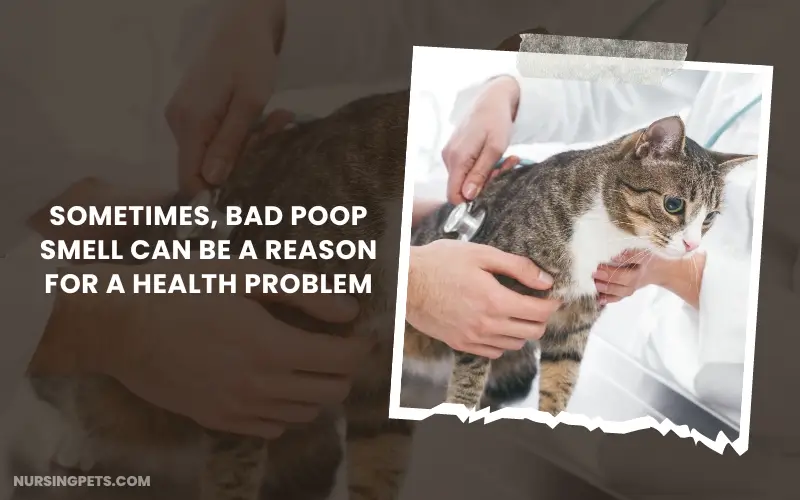
In case you notice a strong, foul odor along with symptoms like diarrhea, blood in the stool, or alterations in frequency or consistency, it could indicate gastrointestinal issues, infections, or dietary problems.
Medical conditions like pancreatitis, intestinal blockages, or malabsorption disorders can also impact the smell of feces.
Does Wet Food Make a Cat’s Poop Smell?
When cats defecate, the odor might be particularly strong if they’ve been eating wet food. Softer, more concentrated stools may result from consuming wet food due to its increased moisture content compared to dry food.
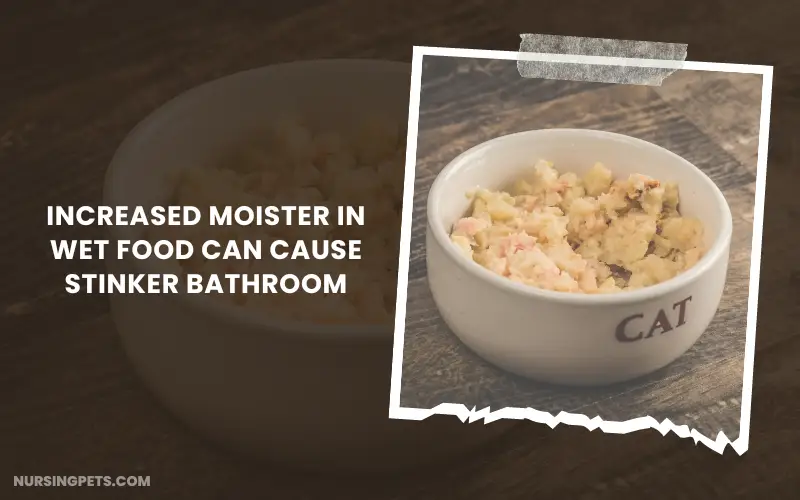
Some canned cat food is loaded with fillers like grains and veggies, which might cause the cat to have more frequent and stinker bathroom breaks. However, the increased water and dietary diversity that wet food offers may be beneficial to a cat’s intestinal health.
How much a cat’s feces smell after eating wet food is contingent on many things, including the quality of the food, the cat’s digestive system, and any underlying health concerns.
Why Does Male Cat Poop Smell So Bad?
Male cat poop can have a strong odor due to a combination of factors. Firstly, male cats have concentrated urine, which contains higher ammonia levels. When mixed with feces, this can intensify the smell. Male cats also have anal glands that secrete a pungent substance.
And we already mentioned that the odor of cat feces can vary based on factors such as diet, health, and other individual variations, but the cat’s gender does not primarily determine it.
Why Does Kitten Poop Smell Worse Than Cat Poop?
Due to its undeveloped digestive system, kitten stool smells worse than cat poop. Compared to adult cats, kittens’ digestive systems are smaller and underdeveloped, which leads to less effective digestion and more smelly waste matter.
Also, kitty poops more often than adult cats, which makes their stench greater. Moreover, the odor of a kitten’s excrement may be affected by their nutrition since a diet heavy in protein or fillers might produce a harsher stink.
6 Effective Tips For Reducing Cat Poop’s Bad Smell
Cat owners may find it difficult to lessen the unpleasant smell of cat waste. There are, nevertheless, several efficient techniques that may lessen odor. Here are a few suggestions for practical approaches.
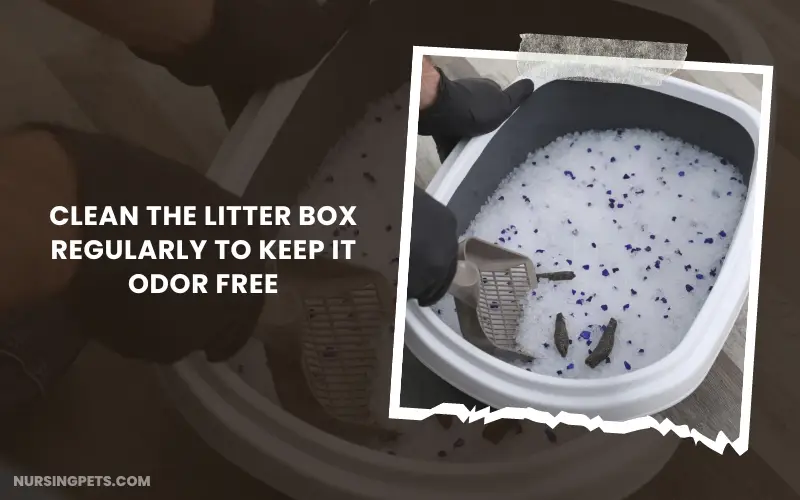
1. Clean the Litter Box Regularly
To lessen the stench of cat excrement, the litter box has to be cleaned often. The stink will become worse the longer you keep excrement in the box. But the accumulation of odor may be avoided by scooping the box at least once each day, and changing the litter every two to three weeks will keep it fresh.
2. Use A High-Quality Litter
The smell of cat excrement may be lessened by using premium, unscented litter. More fillers are often found in lower-quality litter, which may increase the odor.
You can try this litter from Amazon, which quality is excellent, and you can use this litter for multiple cats.
3. Use an Odor-Eliminating Spray
Instead of disguising odors with something, odor-eliminating sprays can neutralize the stink molecules in the air. These sprays are made especially for use in litter boxes and may work well to lessen odor.
4. Improve Your Cat’s Diet
Giving your cat high-quality-balanced food may improve digestion and reduce excrement odor. Less fragrant feces may be produced by eating a diet that is strong in protein and low in fillers.
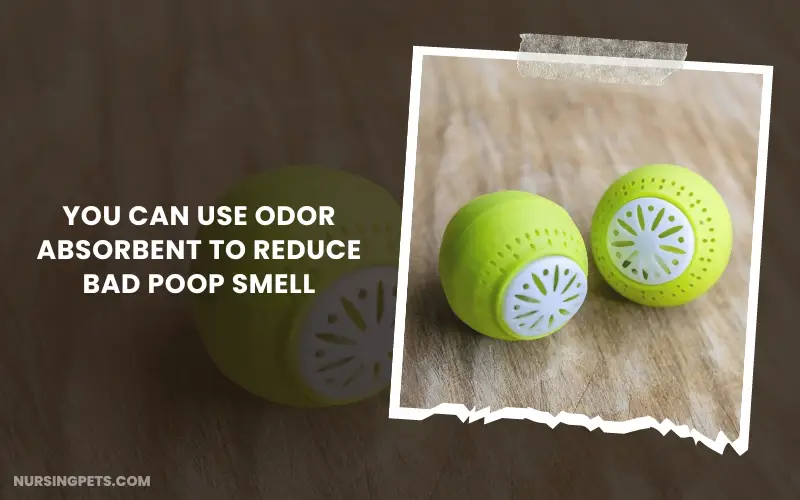
5. Add an Odor-Absorbing Agent to the Litter Box
The stink of the stool may be absorbed and neutralized by adding an odor-absorbing substance to the litter box, such as baking soda or activated charcoal. These substances function by absorbing the odor molecules, which lessens their impact.
6. Provide Adequate Ventilation
The accumulation of scents may be reduced with adequate ventilation. Make sure the litter box is placed in a location with sufficient ventilation, and if required, think about installing an air purifier.
For air purifiers, you can try LEVOIT Air Purifier from Amazon, which removes bad smells and cleans dust and smoke.
Overall, these techniques may be successful in lessening the unpleasant cat feces odor. It’s crucial to keep in mind, however, that consistent alterations in a cat’s feces’ scent or consistency may point to a serious health problem that calls for veterinarian attention.
Some Natural Remedies for Preventing Smelly Cat Poop
Dealing with pungent cat waste may be a difficult and unpleasant experience for cat owners. Try these natural therapies if you don’t want to use any commercial products; they may be just as effective, often more cost-efficient, and better for your cat.
Probiotics
Probiotics are beneficial microorganisms that support cats’ healthy digestion. By encouraging a healthy balance of intestinal flora, adding probiotics to your cat’s food may help lessen the smell of their excrement.
Pumpkin
The natural fiber in pumpkin may help your cat’s digestive tract function normally. Therefore, the stink of your cat’s excrement may be lessened by sprinkling a little quantity of pureed pumpkin onto their diet.
Raw Food Diet
Given that the diet is often higher in protein and lower in fillers, several cat owners have discovered that feeding their cats a raw food diet may result in less fragrant excrement.
Water Intake
Making sure a cat drinks enough water may improve the health of their digestive system and lessen the smell of their excrement. Consider employing a water fountain or giving several water sources to promote drinking.
Keep in mind that even while these natural solutions may help avoid stinky cat feces, it’s always a good idea to speak with your veterinarian before making any changes to your cat’s food or daily care routine.
Frequently Asked Questions
1. Why Does a Cat Poop Smell Worse Than a Dog?
The strong smell of cat poop is attributed to their high-protein diet and shorter digestive tract. Cats produce concentrated compounds as obligate carnivores, resulting in a potent odor. In contrast, dogs’ omnivorous diet and longer digestion process lead to less smelly feces.
2. Can Stress or Anxiety Cause a Cat’s Poop to Smell Worse?
Yes, fear or stress may affect a cat’s digestion and cause them to pass more disagreeable-smelling feces. Cats that are nervous or worried may have diarrhea or constipation, which may produce more smelly feces.
Conclusion
There are natural solutions and actions that cat owners may do to lessen the unpleasant smell of their cat’s excrement, such as giving them a portion of high-quality food, including natural cures, and maintaining a clean litter box.
Overall, recognizing the causes of bad-smelling cat excrement and taking proactive measures to solve the problem may help cats and their owners live healthier and happier lives.
References:
- https://www.aaha.org/publications/newstat/articles/2018-04/woah-doggies-why-does-cat-poop-smell-so-bad/
- https://www.researchgate.net/figure/Chemical-profiles-of-volatile-compounds-emitted-from-cat-bodies-a-Representative_fig5_324409205
- https://www.vet.cornell.edu/departments-centers-and-institutes/cornell-feline-health-center/health-information/feline-health-topics/inflammatory-bowel-disease
- https://www.hyaenidae.org/why-cat-poop-smells-worse-than-dog-poop/
- https://www.preventivevet.com/cats/7-ways-to-reduce-litter-box-smell-and-messes
- https://richmondvalleyvet.com/2019/09/06/remove-cat-poop-smell/

